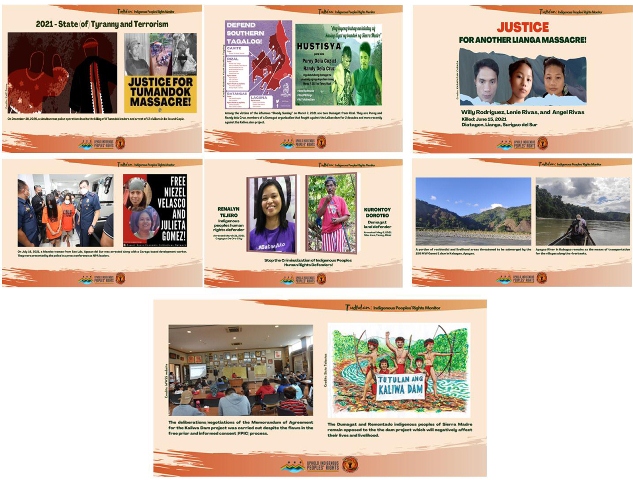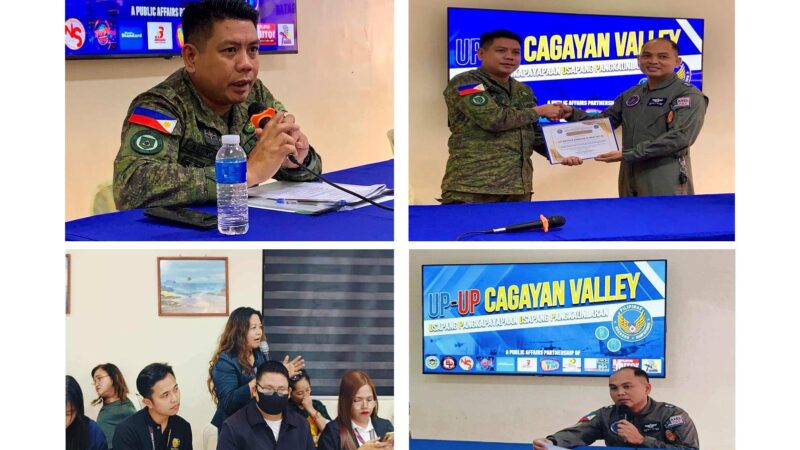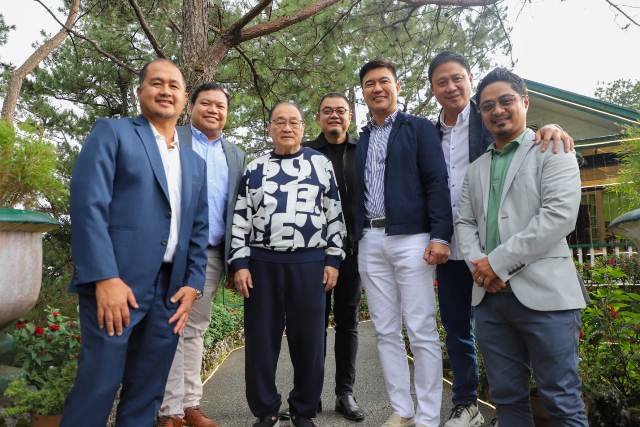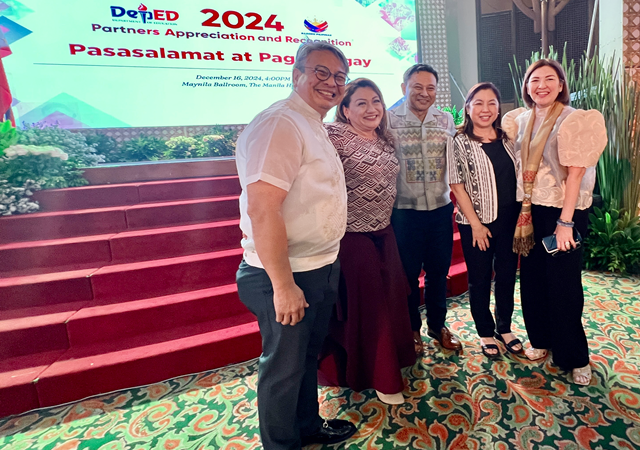Tudtulan: Indigenous Peoples’ Rights Monitor 2021

Indigenous peoples’ rights in the Philippines continue to be violated as the world commemorates International Human Rights Day this December 10, 2021. The Duterte government blatantly disregards the rights of Filipinos, including indigenous peoples, to land, self-determination, social services, decent livelihood, necessary and appropriate infrastructure and rights to civil liberties as citizens.
On December 30 last year, as Filipinos were preparing to welcome the year 2021, simultaneous police operations shocked Tumandok communities in Ilo-ilo and Capiz. This led to the arrest of 17 people and the massacre of 9 Tumandok leaders and community members.
The Tumandok are known for their enduring struggle against the Jalaur River Multi-purpose Project, the Pan-ay dam, and corruption-ridden National Greening Program projects in Panay. They have been steadfast in their defense against human rights violations such as the constant harassment by security forces in their communities.
After just 3 months, on March 7 this year, another round of killings happened to activists in the Southern Tagalog region in Luzon. Among the victims of the infamous “Bloody Sunday” are two Dumagat from Rizal. They are Puroy and Randy dela Cruz, members of a Dumagat organization that fought against the Laiban dam for 2 decades and more recently against the Kaliwa dam project.
These two incidents (Tumandok Massacre and Bloody Sunday) were the result of Synchronized Enhanced Managing Police Operations (SEMPO), which are usually done by the police to go after drug-related suspects.
Another massacre occurred in Surigao del Sur in Mindanao on June 15, 2021. Two Manobo farmers and a student were killed after indiscriminate firing was done by elements of the 3rd Special Forces battalion of the Philippine Army. This happened as the farmers were gathering abaca, a known cash crop of indigenous peoples in the southern regions of the country.
Aside from these massacres, three more indigenous persons were killed in separate incidents in 2021.
There were 24 victims of illegal arrest from December 10, 2020 up to the present. Seventeen of these are Tumandok from Tapaz, Capiz and Calinog, Ilo-ilo. The arrests were done after simultaneous police operations (SEMPO) in the area, which also led to the Tumandok Massacre. On May 6, 2021, a Dumagat land rights defender and anti-dam leader were arrested, just two months after the Bloody Sunday massacre.
On July 16, a month after the second Lianga massacre, Julieta Gomez, a Manobo woman from San Luis, Agusan del Sur, was arrested along with a CARAGA-based development worker. Gomez is the secretary-general of Kasalo, the regional indigenous peoples’ organization in CARAGA. They were presented by the police in a press conference as NPA leaders. One of those arrested and detained (on March 21, 2021) is a young Manobo woman, Renalyn Tejero. She was a student of the Alternative Learning Center for Agricultural and Livelihood Development (ALCADEV), a school located in an indigenous community in Lianga, Surigao del Sur which is also under constant attack by state security agents. She is currently a human rights worker, a paralegal staff of Karapatn in the CARAGA region.
There were also 15 incidents of forced or fake surrender in 2021 alone. The victims are usually residents of a community purported to be strongholds of the New Peoples Army, who are forced to surrender to clear their names. Able-bodied men and women are picked, made to wear masks and participate in a photoshoot in front of guns, explosives, ammunition and flags of the CPP and NPA. They are then reported as surrenderees, leading to a supposed reduction in the size and strength of NPA guerilla units.
Other violations were also reported such as threat, harassment, intimidation, vilification, physical abuse, destruction and divestment of property, among others committed by state security agents. These violations are done mostly in communities believed to be NPA bases and sites for development projects such as mining and dams. The victims are civilians, unarmed and some are not even activists. Primarily targeted and attacked are those who are vocal or connected with organizations carrying out strong campaigns against projects that cause the destruction of ancestral land and the environment. Trumped-up charges were filed against those arrested and detained. Those who were made to surrender as NPA members are not really members or don’t even have connections with them.
The National Task Force to End Local Communist Armed Conflict (NTF-ELCAC) and their continued operations are the main drivers of these violations, especially vilification, arrests and detention. This inter-agency body, which is leading the government’s counter-insurgency campaign, has also targeted legal organizations in their pronouncements and press releases.
State agents are emboldened to abuse their authority as the Duterte government enacted a new Anti- Terrorism law in 2020. The first victims charged, arrested and detained using the said law are two Ayta from Zambales. Indigenous peoples are easily tagged as members and leaders of the CPP-NPA if they are very vocal against destructive projects and are asserting their rights to their ancestral lands.
The implementation of large projects such as large-scale mining and dams violate the collective, economic, social and cultural rights of indigenous peoples. In the year 2021, the right of indigenous communities to free prior and informed consent (FPIC) was violated in the implementation of two projects, the Kaliwa dam and the Gened dam. In the Kaliwa dam project, deliberations for a memorandum of the agreement were carried out despite flaws and irregularities in the FPIC process. Community assemblies were held where the “NO” votes were ignored and the voting was manipulated to make it appear that the “YES” votes prevailed. For the Gened dam project, a Certification Precondition was issued by the National Commission on Indigenous Peoples (NCIP) despite anomalies and flaws in the whole FPIC process. The collective decision of the communities arrived at through traditional means was ignored. Falsification of signatures and creation of a false council of leaders was done to come up with a consenting vote for the Isnag in Kabugao, Apayao.
Also in 2021, the giant mining company, OceanaGold Philippines, based in Kasibu, Nueva Vizcaya, was granted a renewal of its Financial and Technical Assistance Agreement (FTAA) with the government, extending their destructive open-pit mining operations for another 25 years. This was despite a valid opposition of the Ifugao residents in Didipio based on violations committed by the mining company in the course of its operations under the first FTAA. A mining ban or a moratorium on the approval of new mining applications in the Philippines (from way back 2012) was also lifted by the government through Executive Order 130. This executive order is very dangerous for indigenous peoples whose territories include mineral-rich lands, as it opens up the door for destructive large-scale mining corporations to come in.
There are also violations of the right to self-determination and social services of indigenous peoples. This is one of the Duterte government’s trademarks as it blatantly attacked and shut down Lumad community schools in different areas in Mindanao. In 2021, there were 41 cases involving Lumad schools, teachers, students, parents and communities. For health services, particularly those related to COVID-19, there is no clear program yet to facilitate services such as testing and vaccines for indigenous peoples. Their movements remain restricted and visits to their communities have stringent requirements imposed by the local government units in municipalities where they are located.
2021 is the last full year of Duterte’s presidency. What happened to indigenous communities during this time reflects a tyrannical rule with blatant disregard for human rights. These violations of indigenous peoples’ rights were committed in a situation where mobility of indigenous peoples remain restricted due to COVID 19 and the requirement of vaccines and negative test results for travel.
As the Philippines approaches the holding of national elections in May 2022, the facts in this report need to be considered when choosing the next leaders and lawmakers of the country. We must not allow another 6 years of rule of tyranny and human rights violations. Indigenous peoples must be allowed to enjoy their rights as guaranteed by our national laws and international human rights instruments.
Stop the Killings! Stop the attacks against indigenous peoples! No to destructive mining, dams and other businesses in IP territories! Uphold the right to FPIC! Uphold Indigenous Peoples’ Rights! #
For Reference:
Tyrone Beyer
Policy Advocacy Officer, TFIP







